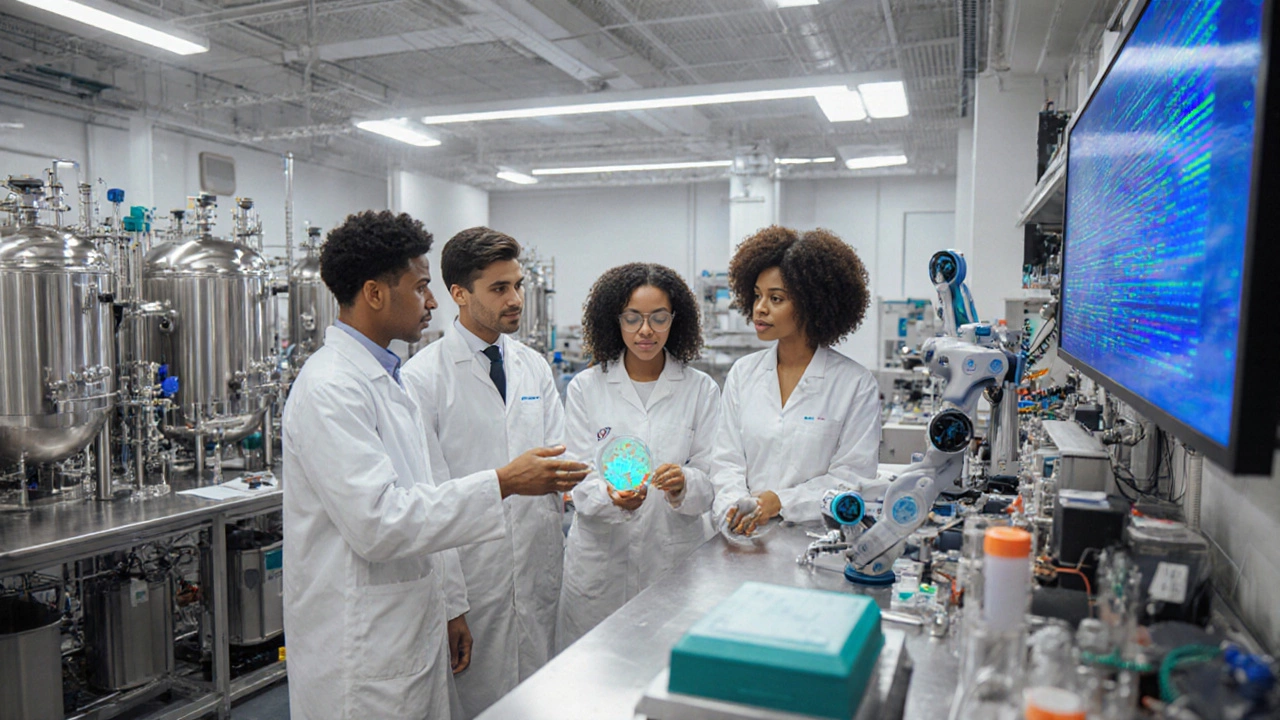Biotechnology Jobs: Career Paths, Salaries, and How to Get Started
 Oct, 5 2025
Oct, 5 2025
Biotech Career Path Finder
Your Recommended Career Path
Top Skills:
Key Takeaways
- Biotech offers a wide range of roles from lab science to regulatory affairs and sales.
- Typical entry qualifications range from a BSc in a life‑science field to specialised master’s programmes.
- Median salaries in the UK vary from £28k for junior lab technicians to over £70k for senior regulatory specialists.
- Hands‑on experience, internships, and professional certifications dramatically improve hiring chances.
- Career progression often moves from technical specialist to project manager or business development lead.
Ever wondered what you can actually do with a degree in biology, chemistry, or genetics? The answer lies in the booming world of biotechnology jobs. Companies are racing to develop new medicines, sustainable bio‑fuels, and cutting‑edge diagnostics, and they need people with the right mix of scientific know‑how and business savvy. This guide walks you through the most common roles, the skills they demand, salary expectations, and concrete steps to land your first position.
What is Biotechnology?
Biotechnology is a field that applies biological systems, organisms, or derivatives to develop products and technologies that improve health, agriculture, and industry. In the UK, the sector contributes over £5billion annually to the economy and employs more than 45,000 people, according to the latest report from UK BioIndustry Association. Its rapid growth creates a steady stream of new job titles, each with its own niche.
Core Scientific Roles
These positions sit at the heart of product discovery and development. They typically require a bachelor’s degree in a life‑science discipline, with many employers preferring a master’s or PhD for senior work.
Biotech Engineer designs, builds, and optimises the equipment and processes used to manufacture biological products.
- Key tasks: scale‑up fermentation, develop bioreactor protocols, ensure process safety.
- Typical degree: BEng/MEng in Biological Engineering or Chemical Engineering.
- Median UK salary: £45,000‑£60,000.
Bioinformatician combines biology with data analysis to interpret large‑scale genomic and proteomic datasets.
- Key tasks: write scripts in Python or R, develop pipelines for next‑generation sequencing, collaborate with wet‑lab teams.
- Typical degree: BSc in Bioinformatics, Computational Biology, or a related MSc.
- Median UK salary: £38,000‑£55,000.
Molecular Biologist investigates the structure and function of genes, proteins, and other molecules to understand disease mechanisms.
- Key tasks: PCR, cloning, CRISPR editing, assay development.
- Typical degree: BSc/MSc in Molecular Biology or Genetics.
- Median UK salary: £30,000‑£45,000.
Bioprocess Engineer focuses on translating laboratory‑scale discoveries into commercial‑scale production pipelines.
- Key tasks: design upstream fermentation, downstream purification, process validation.
- Typical degree: MSc in Bioprocess Engineering or related field.
- Median UK salary: £48,000‑£65,000.
Genetic Counselor interprets genetic test results and provides guidance to patients and families.
- Key tasks: patient interviews, risk assessment, multidisciplinary team discussions.
- Typical qualification: MSc in Genetic Counselling plus certification by the UK Board of Genetic Counselling.
- Median UK salary: £38,000‑£55,000.

Regulatory, Quality, and Clinical Roles
Beyond the bench, biotech firms must meet strict safety standards and prove that their products work. These roles ensure compliance and smooth market entry.
Quality Assurance Analyst monitors manufacturing processes to guarantee that products meet predefined specifications.
- Key tasks: audit SOPs, perform batch release testing, document deviations.
- Typical degree: BSc in Science with a focus on Quality Management, often supplemented by ISO 9001 training.
- Median UK salary: £35,000‑£48,000.
Regulatory Affairs Specialist liaises with agencies like the MHRA to secure product licences and maintain compliance.
- Key tasks: prepare IND/CTA submissions, track regulatory changes, advise R&D teams.
- Typical qualification: MSc in Regulatory Science or a related MSc, plus certification such as RAPS.
- Median UK salary: £55,000‑£75,000.
Clinical Research Associate (CRA) oversees the conduct of clinical trials, ensuring data integrity and patient safety.
- Key tasks: site monitoring, source data verification, reporting adverse events.
- Typical qualification: BSc in Life Sciences plus GCP training; many hold a postgraduate certificate in Clinical Trials.
- Median UK salary: £40,000‑£58,000.
Business, Sales, and Support Roles
Not every biotech career stays in the lab. Companies need people who can translate science into commercial success.
Biotech Sales Representative sells laboratory equipment, reagents, or biotech services to research institutions and hospitals.
- Key tasks: build client relationships, deliver product demos, hit sales targets.
- Typical background: BSc in Biology or Chemistry plus strong communication skills; many companies provide product‑specific training.
- Median UK salary: £30,000 base + commission (often £55,000 total).
Intellectual Property Analyst
- Key tasks: conduct patent searches, draft applications, monitor competitor filings.
- Typical qualification: MSc in Patent Law or a science degree combined with a law conversion course.
- Median UK salary: £45,000‑£62,000.
Salary Snapshot & Skill Matrix
| Job Title | Median Salary (£) | Common Qualification | Top 3 Skills |
|---|---|---|---|
| Biotech Engineer | 52,500 | MEng Biological Engineering | Process Design, CAD, GMP |
| Bioinformatician | 46,000 | MSc Bioinformatics | Python/R, Data Pipelines, Statistics |
| Molecular Biologist | 38,000 | BSc Molecular Biology | PCR, CRISPR, Lab Notebook |
| Bioprocess Engineer | 56,500 | MSc Bioprocess Engineering | Scale‑up, Downstream Purification, Validation |
| Genetic Counselor | 46,500 | MSc Genetic Counselling | Risk Assessment, Patient Communication, Ethics |
| Quality Assurance Analyst | 41,500 | BSc Science + ISO 9001 | Auditing, Documentation, Regulatory Knowledge |
| Regulatory Affairs Specialist | 65,000 | MSc Regulatory Science | MHRA Submissions, Risk Management, Project Coordination |
| Clinical Research Associate | 49,000 | BSc Life Sciences + GCP | Site Monitoring, Data Review, Communication |
| Biotech Sales Rep | 30,000 base + commission | BSc Biology/Chemistry | Customer Relations, Presentation, Negotiation |
| Intellectual Property Analyst | 53,500 | MSc Patent Law / Science + Law | Patent Search, Drafting, Legal Analysis |

How to Break Into the Biotech Industry
- Choose the right academic path - a BSc in a relevant science is the minimum; consider a master’s if you aim for data‑intensive or regulatory roles.
- Gain practical experience - internships, university labs, or part‑time positions give you hands‑on credibility.
- Earn industry‑recognised certifications - GCP for clinical work, ISO 9001 for QA, or RAPS for regulatory affairs.
- Build a professional network - attend UK BioIndustry Association events, local biotech meet‑ups, and LinkedIn groups.
- Tailor your CV and cover letter - highlight project outcomes (e.g., "optimised fermentation yield by 22%") and quantify achievements.
- Prepare for technical interviews - be ready to discuss experimental design, data analysis pipelines, or regulatory timelines, depending on the role.
Career Progression Paths
Most biotech professionals start as junior scientists or analysts and can move into senior specialist, team lead, or managerial positions within 5-7years. For example, a Biotech Engineer may become a Process Development Manager, then a Director of Manufacturing. Similarly, a Bioinformatician can progress to Lead Data Scientist, eventually overseeing the company’s entire data‑strategy. Soft skills such as project management, communication, and business acumen often accelerate the climb.
Future Trends Shaping Job Opportunities
- Artificial‑intelligence‑driven drug discovery - creates demand for hybrid roles that combine AI expertise with biology.
- Personalised medicine - expands genetic counselling and bio‑informatics positions.
- Sustainable biomanufacturing - fuels growth in bioprocess engineering focused on low‑carbon footprints.
- Regulatory harmonisation post‑Brexit - raises the need for specialists who can navigate both EU and UK frameworks.
Frequently Asked Questions
Do I need a PhD to work in biotech?
Not for most entry‑level positions. A bachelor's degree can land you a lab technician or QA role. A PhD becomes essential for independent research, senior scientist, or lead project manager positions.
What’s the difference between a Biotech Engineer and a Bioprocess Engineer?
A Biotech Engineer typically works on equipment design and proof‑of‑concept prototypes, while a Bioprocess Engineer focuses on scaling those prototypes to full‑volume manufacturing, ensuring consistency and compliance.
How important are internships for getting a biotech job?
Very important. Internships give you lab experience, industry contacts, and often lead to graduate schemes. Companies frequently hire interns for full‑time roles because they already know your work ethic.
What certifications boost a regulatory affairs career?
RAPS Certified Regulatory Professional (RCP) and the UK’s MHRA‑specific training are most valued. A postgraduate diploma in Regulatory Science also signals commitment.
Can I switch from a lab role to a sales position?
Yes. Many biotech firms train technically‑savvy sales reps. Highlight your product knowledge, communication skills, and any customer‑facing experience from conferences or collaborations.